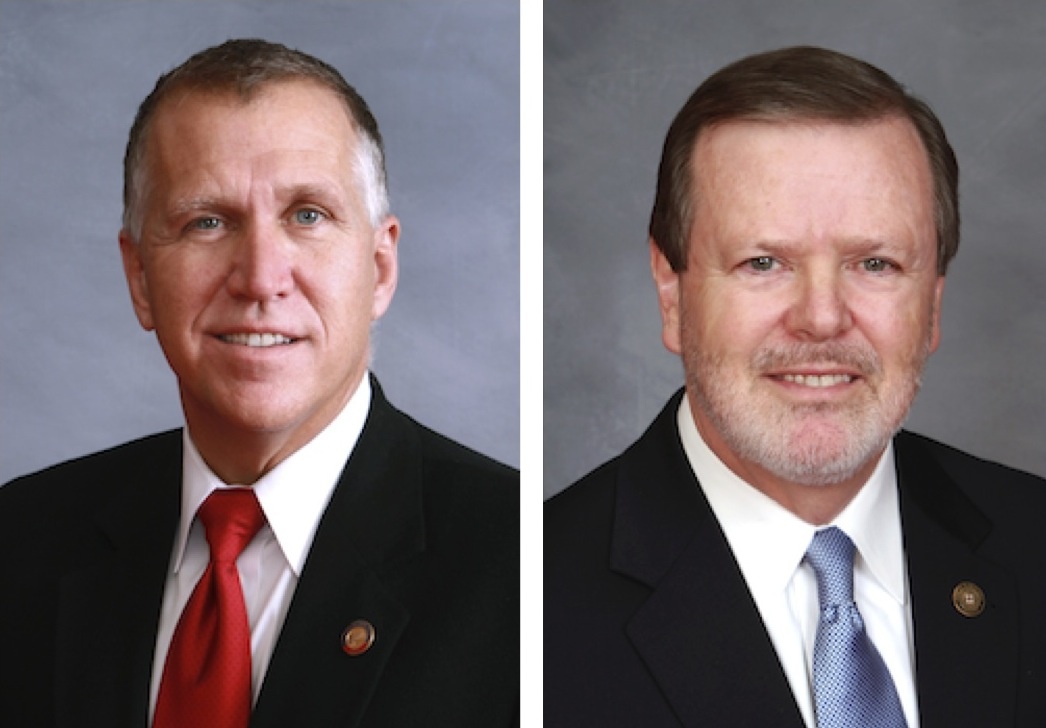NC legislative leaders breaking records for special-interest fundraising

The leaders of the North Carolina General Assembly are raising more money from special-interest political action committees than their predecessors, despite promises of ending the state's "pay to play" political culture.
A new analysis by the campaign finance watchdog group Democracy North Carolina found that as of July 1, after 18 months of fundraising in the 2012 election cycle, House Speaker Thom Tillis (R-Mecklenburg) (photo, left) had received $341,450 from dozens of PACs associated with utilities, banks, health care companies, insurance firms and other trade groups.
During the same period, Senate President Pro Tem Phil Berger (R-Rockingham) (photo, right) had raised $320,600 from a similar set of interests.
"Those amounts are over $100,000 more than what the previous leaders -- Democratic House Speaker Joe Hackney and Senate President Pro Tem Marc Basnight -- raised at a similar point in the 2010 campaigns," Democracy North Carolina said in a release about its findings.
In 2010, the state's voters elected the first North Carolina General Assembly with a Republican majority in both chambers since 1870. Republicans and independent groups criticized the previous Democratic leadership for fostering a statehouse culture that rewarded donors with favors.
But the numbers show that the new Republican leaders are relying even more heavily than their Democratic predecessors on funds from interests with a legislative agenda.
Of the $946,000 that Speaker Tillis has raised so far this cycle, 36 percent has come from PACs. And of the $974,000 raised so far by Senate President Pro Tem Berger, 33 percent came from PACs. At a similar point in the 2010 campaign, Hackney and Basnight raised 25 percent and 20 percent of their totals from PACs.
Democracy North Carolina also pointed to a recent report by WRAL-TV that shows lobbyists are under pressure to make donations to the House speaker. An email sent last week by Tillis' political director, Lucy Croxton, to lobbyists and special-interest leaders announces an "appreciation event" set for Oct. 11 to honor all PACs that gave the maximum $4,000 in the current election cycle:
We are asking for all checks to be written to the maximum the PAC is planning to give by Friday, September 14th. If there is a problem getting them to us by this date, please let me know by September 14th when we should plan to receive the check and for what amount, and I will make sure to include you as well.
Under North Carolina law, it is illegal for a political campaign to take money from lobbyists. A disclaimer at the bottom of Croxton's email acknowledges this and asks lobbyists to "pass the information along to any interested parties and recommend support where appropriate."
"This is a shakedown, plain and ugly, and it's apparently working," says Bob Hall, Democracy North Carolina's executive director. "Lobbyists and groups with issues in the General Assembly are being pressured to pony up money to the head man. It's the textbook definition of pay-to-play politics."
Hall observed that the practice hearkens back to the era of Democratic House Speaker Jim Black, whose close relationships with lobbyists and deal-making with special interests led to his 2007 resignation and conviction for felony corruption. The scandal led to changes in state ethics and campaign finance laws -- including a ban on lobbyists making donations to state lawmakers.
Democracy North Carolina supports a public financing alternative for candidates who rely on small contributions from voters rather than special-interests donations. Such a program is available to candidates for the state's appellate courts and some executive offices but not for state legislators.
Tags
Sue Sturgis
Sue is the former editorial director of Facing South and the Institute for Southern Studies.
